TL;DR: Automate SEO audits with AI to rapidly identify website issues and optimize your site smarter, not harder. This guide breaks down everything you need to supercharge your website's SEO health.
Everyone knows SEO audits are essential for a healthy website.
But what does it mean to automate SEO audits with AI?
In this comprehensive guide, you’ll get a complete cheat sheet for using AI to streamline your SEO audits.
Some are time-consuming and error-prone when done manually.
Some are limited by human insight and outdated tools.
Some can overlook hidden technical or content issues that slow your growth.
Some AI-powered tools analyze thousands of pages in minutes.
Some generate actionable, tailored recommendations that even beginners can follow.
Let’s dive right in.
What Does It Mean to Automate SEO Audits with AI?
Automating SEO audits with AI means using intelligent software powered by machine learning and natural language processing to automatically scan your website, analyze its SEO health, and pinpoint issues without manual labor.
This technology can:
- Quickly crawl thousands of pages like search engines do
- Detect broken links, redirect loops, and sitemap errors
- Evaluate site speed, mobile responsiveness, and UX metrics
- Analyze content for keyword stuffing, duplication, and thin content
- Assess backlink profiles to identify toxic links or link opportunities
- Forecast SEO risks and prioritize fixes based on impact
Compared to traditional audits, AI-powered audits are faster, more accurate, and dynamically improve through learning from data patterns over time. This invaluable automation frees up your SEO team’s time for strategic efforts rather than routine checks.
Think of automating SEO audits like having a tireless SEO specialist who never sleeps and is faster than any human at catching even subtle SEO flaws on your site, as explained in depth by Nightwatch.
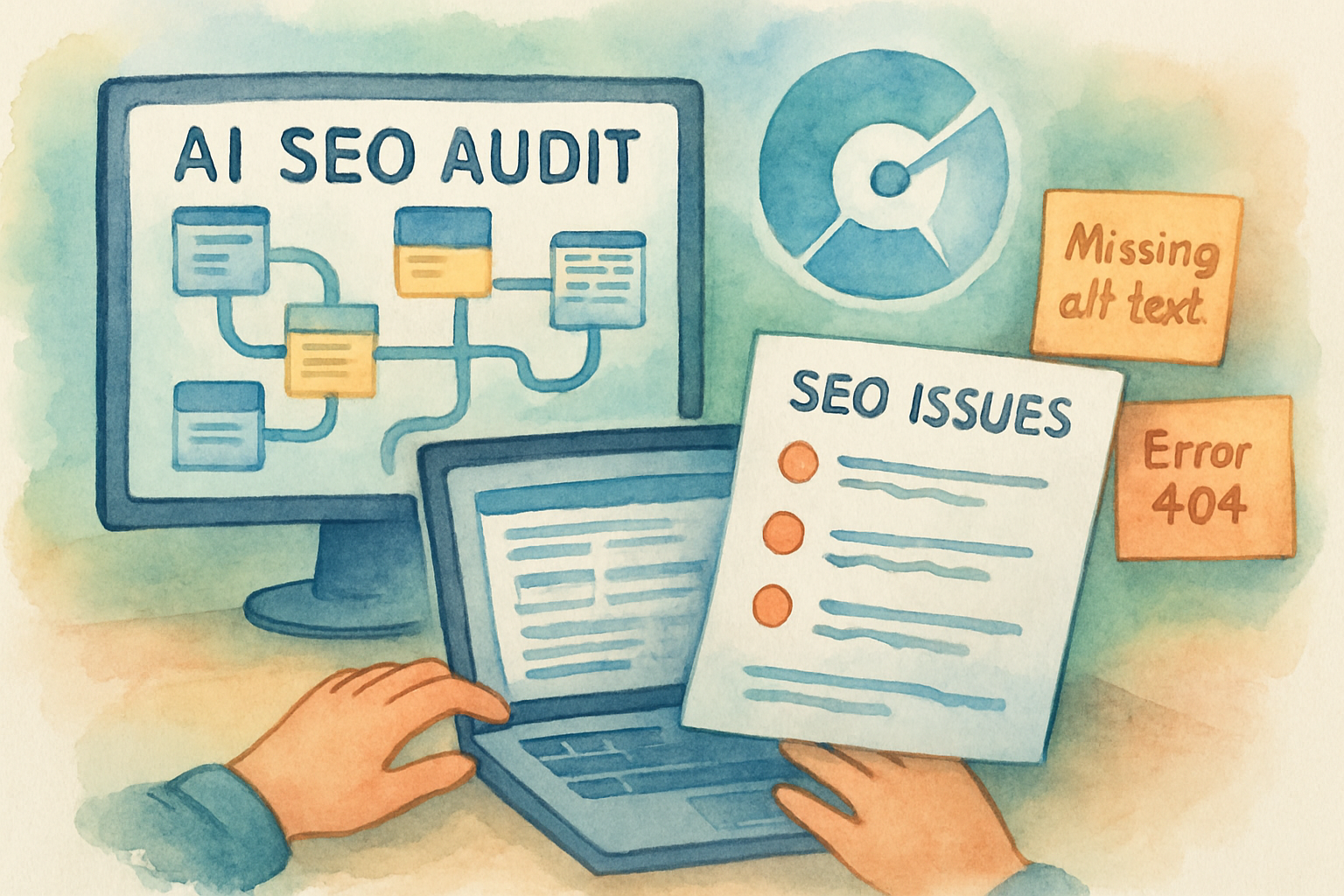
Why Should You Use AI to Automate Your SEO Audits?
Traditional SEO audits are often slow and require technical expertise. Manual audits can take days or even weeks to thoroughly check all SEO factors across a large site. The complexity also often leads to incomplete reports and confusion about priorities.
AI transforms the audit process by increasing speed and depth, while delivering easy-to-understand insights.
Some key benefits of automating your SEO audits with AI include:
- Efficiency: Scan thousands of pages in minutes, not days.
- Comprehensive insights: Identify technical issues, content gaps, and backlink problems in one report.
- Predictive analysis: Forecast how emerging problems will impact rankings over time.
- Clear prioritization: Get AI-driven recommendations focused on high-impact fixes to maximize ROI.
- Accessible for beginners: AI explains issues in plain language and guides you through fixes step-by-step.
- Continuous improvement: Automated recurring audits keep your SEO up to date without extra effort.
This automation profits marketers by freeing them from tedious technical checks, letting teams focus on higher-level optimization and content strategy, as detailed by Alliai.
Furthermore, integrating AI SEO agents into your workflow streamlines collaboration across marketing, development, and content teams by assigning clear tasks based on audit results. This not only saves time but improves overall site health consistently.
How Does AI Automate SEO Audits Work?
AI-powered SEO audits use sophisticated algorithms to mimic search engine crawlers but with added intelligence. Here's how:
- Automated Crawling: The AI bot crawls your entire website structure like Google, scanning technical factors (redirects, broken links, page speed).
- Content Analysis: Using Natural Language Processing (NLP), AI assesses your content’s relevance and quality, detecting thin pages, duplicate content, and keyword stuffing.
- Backlink Profiling: It evaluates your link profile for toxic links that harm your SEO and identifies new link-building opportunities.
- Performance Metrics: Measures Core Web Vitals, mobile usability, and other user experience factors critical for ranking.
- Predictive Insights: AI models analyze historical trends to forecast potential future SEO risks and prioritize fixes.
- Customizable Prompts: You can tailor the AI’s scan depth and focus areas by providing specific instructions or prompts, enhancing relevance.
This dynamic and all-encompassing approach uncovers a breadth of issues invisible to manual audits and static tools. It also learns over time to provide increasingly personalized recommendations, creating a virtuous cycle of SEO improvements.
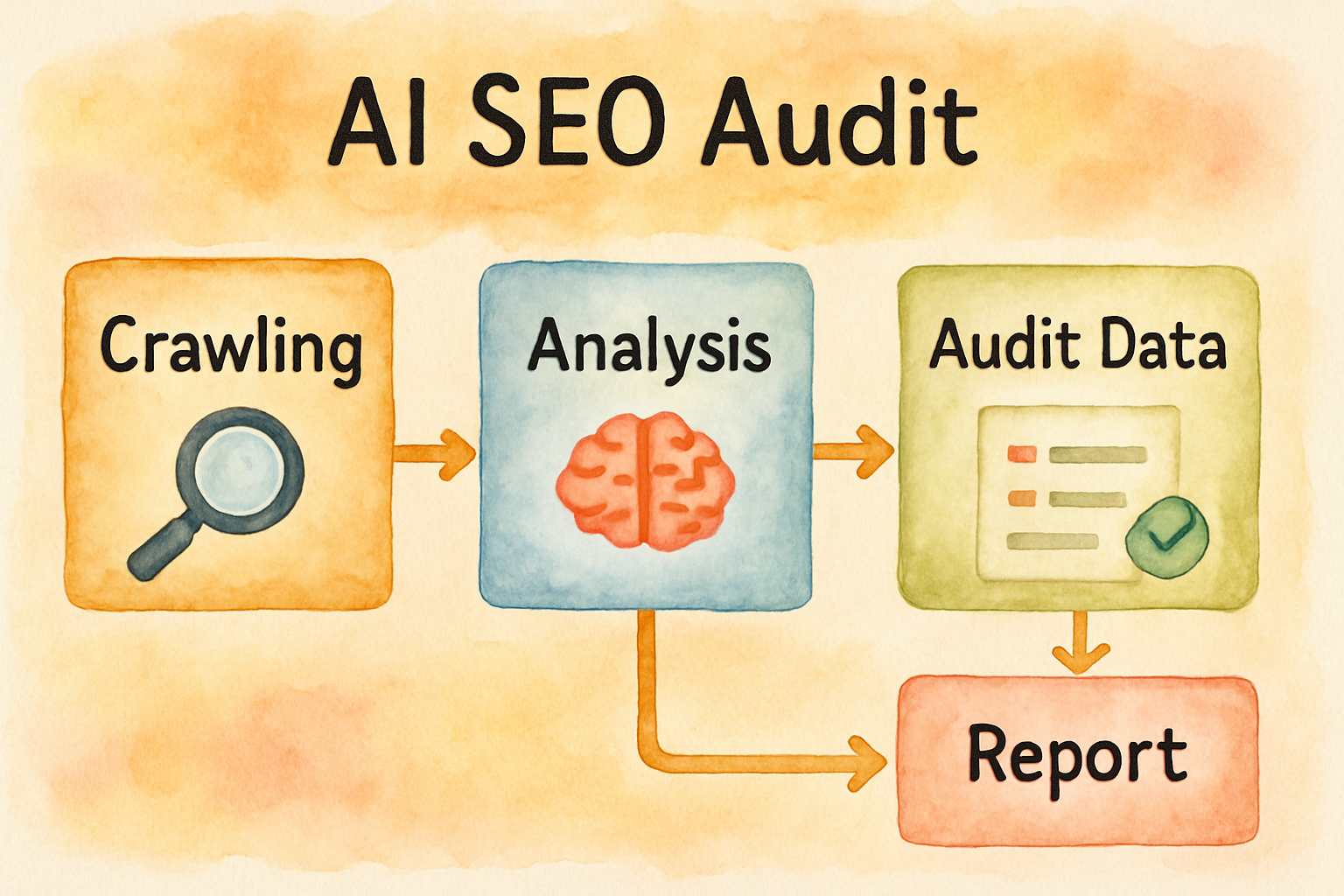
What Are the Best Practices for Automated AI SEO Audits?
To get the most from AI SEO audits, simply running scans is not enough. Follow these expert tips:
1. Define Clear Objectives Before Auditing
Identify whether your main goals are technical SEO improvements, content quality enhancements, or improving user experience metrics. Tailor your AI tool's prompts accordingly.
Example: If you want to focus on user experience, prompt the AI to audit Core Web Vitals and mobile usability first.
2. Integrate Data Sources for Richer Insights
Connect your AI audit tool with Google Search Console and Google Analytics. These integrations provide additional context like traffic patterns and user behaviour, enabling smarter recommendations.
3. Use AI Audit Reports as a Starting Point
AI tools boost efficiency but human expertise remains critical. Use AI findings to prioritize issues, then apply strategic SEO knowledge and collaborate with developers and content teams for effective fixes.
4. Schedule Recurring AI Audits
Set your AI audit tool to run regular scans monthly or biweekly. This helps catch issues early, track progress over time, and stay ahead of algorithm updates.
5. Focus on High-Impact Fixes First
AI audits often return many problems. Prioritize those that most affect rankings and user experience to get quick wins and maintain motivation.
6. Benchmark Against Competitors
Use AI-powered competitor analysis to identify keyword gaps, backlink opportunities, and content strategies you can leverage to outrank rivals.
Following these practices ensures your automated AI SEO audits lead to actionable, measurable improvements—and make your SEO strategy smarter and more resilient. For deeper strategy insights, consider consulting expert marketing resources.
How to Start Automating SEO Audits with AI: Step-by-Step
Starting your journey to automate SEO audits with AI is straightforward but requires a planned approach:
Step 1: Choose the Right AI SEO Audit Tool
Look for tools offering deep crawl capabilities, content analysis using NLP, backlink profiling, and integration with popular analytics platforms. User-friendly dashboards and AI-powered assistants like Nightwatch’s AI SEO agent make experience seamless for beginners and experts alike (source).
Step 2: Set up Your Account and Connect Data Sources
After registration, add your website domain. Link Google Search Console and Google Analytics accounts to enrich audit data.
Step 3: Define Your Audit Scope and Prompts
Use clear, specific AI prompts to tailor your audit, such as checking for “broken links and redirect loops” or “keyword cannibalization and thin content.” This customization refines results and saves time.
Step 4: Run the Audit and Review Results
Initiate the AI crawl and watch as it scans your entire site rapidly. Review the generated report and pay attention to prioritized issues and recommended fixes.
Step 5: Assign Fixes and Collaborate
Share AI-generated actionable instructions with developers or content creators. This ensures everyone understands what to fix and how.
Step 6: Schedule Regular Audits and Track Progress
Automate recurring audits to maintain site health. Monitor trends in your SEO reports to verify the impact of fixes.
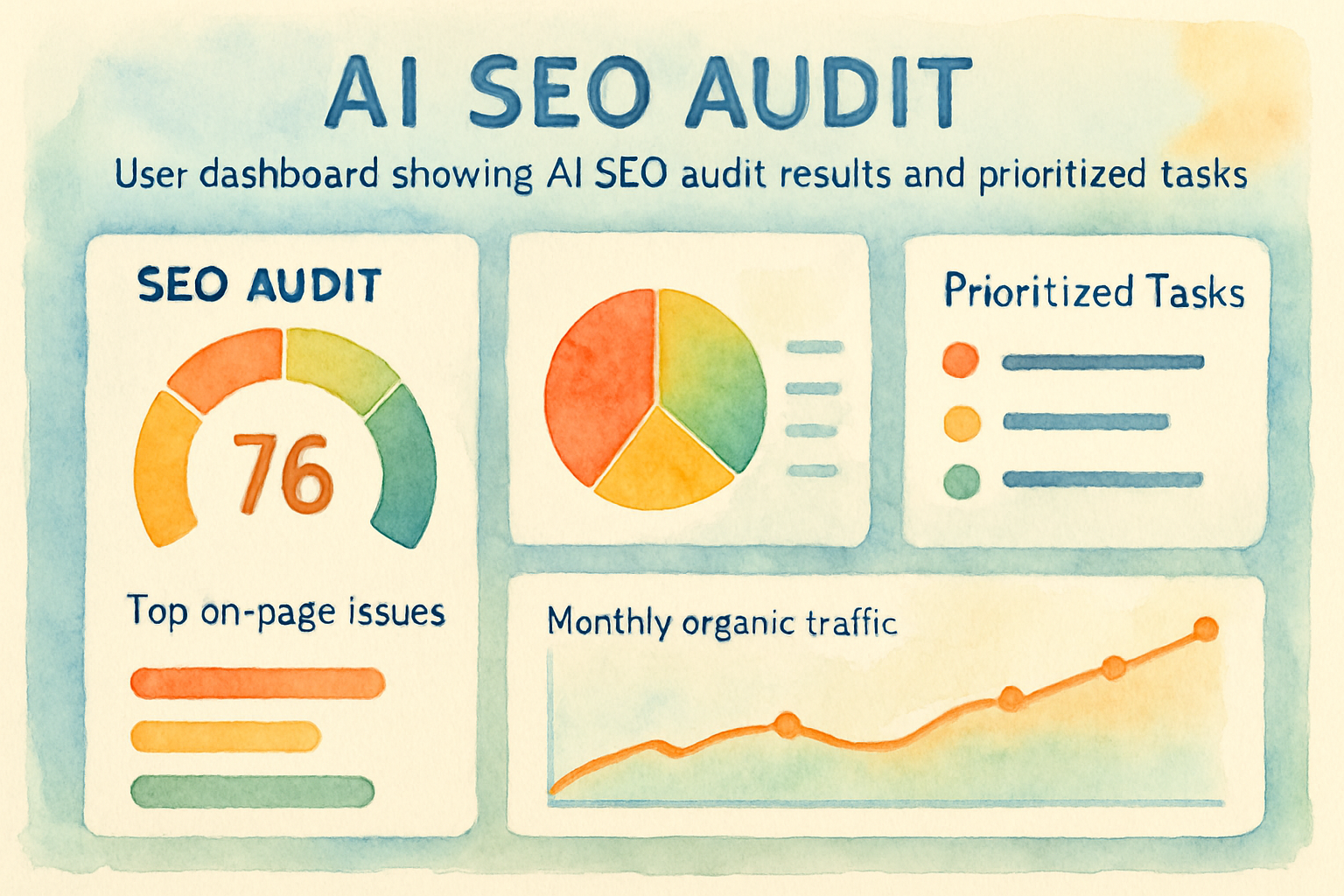
What Common Questions Do People Have About Automated AI SEO Audits?
Can AI audit tools replace SEO experts?
No. AI is a powerful assistant but expert human insight is essential for interpreting complex issues and developing strategy. Successful SEO blends AI efficiency with human judgment, as corroborated by Alliai.
How often should I run AI-powered SEO audits?
Monthly or bi-weekly audits are ideal to promptly catch new issues without overwhelming teams. Automated scheduling features help.
Can AI detect content quality issues?
Yes. Advanced NLP allows AI to flag thin content, outdated pages, keyword stuffing, and content gaps compared to competitors.
Will automating audits save money?
Yes. Automating time-consuming manual tasks improves efficiency and lets your team focus on high-value SEO activities that drive ROI.
Is technical knowledge required to use AI SEO audit tools?
Many AI audit platforms are designed for users with all skill levels. Tutorials, onboarding guides, and plain-language recommendations lower barriers to entry.
How Can AI-Driven Competitive Analysis Boost Your SEO?
AI audits go beyond just your site. They analyze competitor websites to uncover keyword targets, content strategies, backlink profiles, and technical SEO strengths or weaknesses.
This intelligence enables you to:
- Identify high-value keywords your competitors rank for but you currently miss.
- Spot backlink opportunities by reviewing competitors’ link sources.
- Learn from their site structure and UX best practices to improve your architecture.
- Strategically plan content to fill gaps and differentiate your brand.
By weaving regular competitor benchmarking into your audit workflow, you maintain competitive agility and increase your chances of outranking rivals.
Take advantage of AI competitor analysis tools highlighted in the Nightwatch AI SEO agent and champion a data-backed approach that keeps you ahead.
How are you currently monitoring your competitors' SEO efforts?What Are the Top Tools to Automate SEO Audits with AI?
Several AI SEO platforms specialize in automating audits while providing comprehensive analysis and actionable insights.
Popular options include:
- Nightwatch: An AI SEO agent offering customizable prompts, detailed technical and content audits, backlink analysis, and competitor insights. It integrates with Google Analytics and Search Console for enriched data.
- Alliai: AI SEO agents geared towards integrating into existing workflows, automating keyword research, content optimization, and predictive analytics.
- Other tools: Emerging AI SEO software and platforms also blend automated crawling, NLP content audits, and smart recommendations.
When choosing tools, focus on deep analytics capabilities, seamless integration with your existing marketing stack, customization options, and user-friendly reporting. This ensures smooth implementation and adoption across teams.
To maximize impact, pair AI audit tools with other AI-powered SEO solutions such as automated keyword research and content creation platforms. This holistic approach accelerates your organic growth.
For more insights on AI-tools that boost SEO workflows, check out this detailed post on automating SEO content creation.
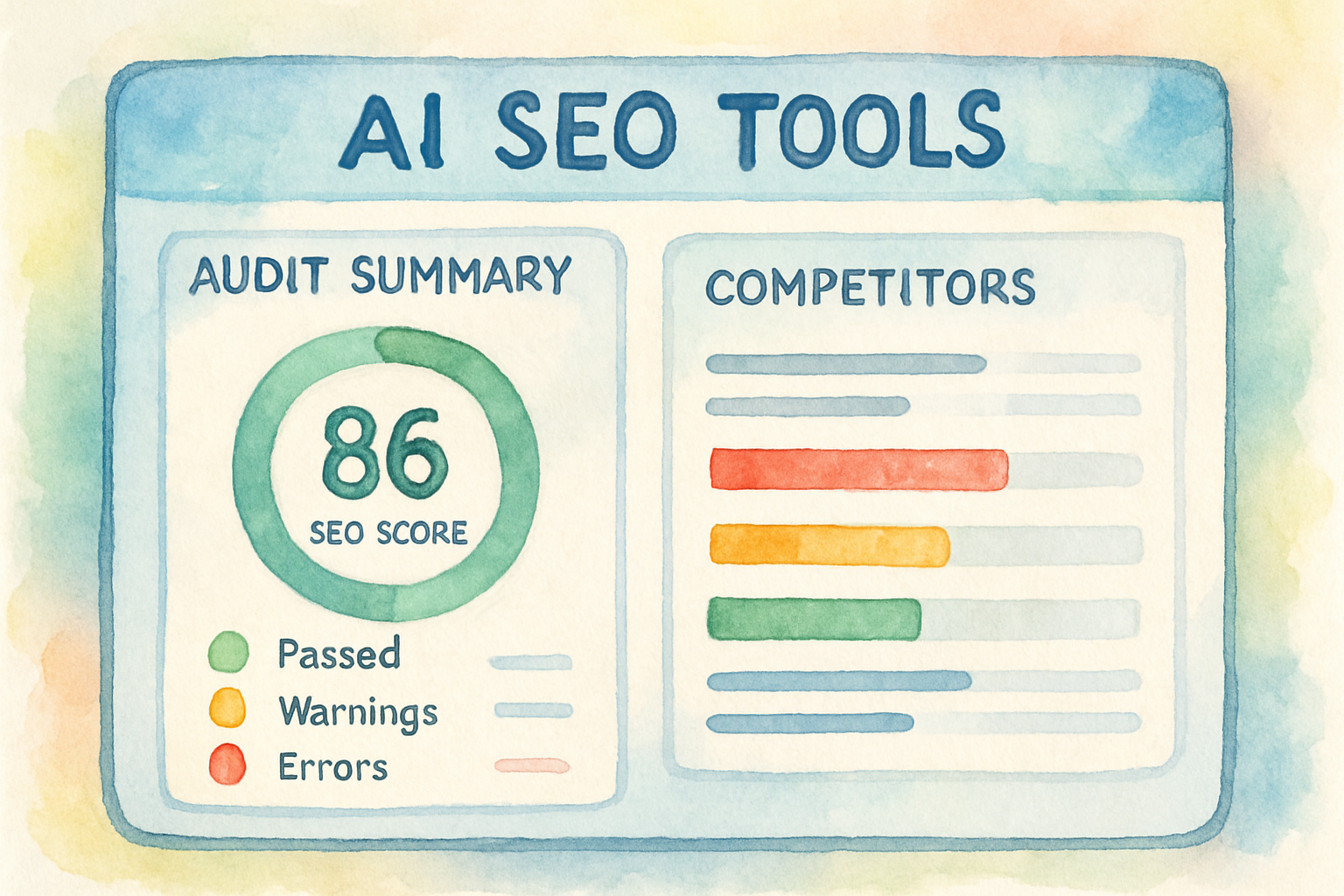
How Do You Implement AI Into Your SEO Workflow Effectively?
Integrating AI into your SEO workflow requires planning and team collaboration for best results.
Here’s a concise roadmap:
- Assess Current Processes: Map your existing SEO workflow to identify repetitive, time-consuming tasks.
- Determine AI Integration Points: Choose where AI agents can add the most value—technical audits, content optimization, competitor research.
- Choose AI Tools: Select AI solutions that fit your goals and integrate well with your tech stack and teams.
- Train Your Team: Educate marketers, developers, and content creators on how to use AI tools and interpret audit results.
- Launch Gradually: Implement AI tools in phases to minimize disruptions and allow adjustments.
- Monitor & Optimize: Track KPI improvements like rankings, traffic, and engagement. Adjust AI applications and strategies accordingly.
- Encourage Collaboration: Foster open communication between teams to seamlessly use AI-generated insights for content creation and technical fixes.
This structured approach helps your organization leverage AI-enhanced SEO audits to improve accuracy, efficiency, and innovation. For more on building smart, integrated SEO systems, explore comprehensive content marketing guides.
How Can You Prioritize Fixes After an AI Automated SEO Audit?
AI audits can identify a long list of SEO issues – from minor annoyances to critical blockers. Prioritization ensures you fix what matters most first:
- Focus on high-impact problems: Issues causing crawl errors, broken links, or slow page speed typically have immediate ranking and UX impact.
- Address content gaps and duplicate content: Fix thin or cannibalized content that confuses search engines and misses user intent.
- Resolve UX and performance issues: Optimize Core Web Vitals, mobile responsiveness, and navigation for better engagement.
- Fix backlink risks: Disavow toxic links and pursue authoritative backlink opportunities to boost domain authority.
- Consider business goals: Align audit priorities with your marketing objectives (e.g., improve conversions vs. brand awareness).
Applying this focus prevents wasted effort and maximizes SEO ROI. Remember, quick wins build momentum toward comprehensive website health.
Can AI Automated SEO Audits Detect Technical SEO Issues?
Absolutely. One of the biggest benefits of automating with AI is its ability to rapidly uncover technical SEO issues that stunt rankings:
- Broken links and 404 errors
- Redirect loops and improper URL structures
- Confusing or incorrect sitemap files
- Slow-loading scripts and uncompressed images
- Missing or duplicate meta tags and header usage
- Server errors and crawl budget wasting problems
Because AI crawlers mimic search engines, they find hidden problems humans or static tools often miss. Detailed reports come with solutions explained in plain English, guiding even non-technical users through fixes, as highlighted by Nightwatch.
How Does AI Help with Content Quality During SEO Audits?
AI enhances content evaluation beyond keyword presence. Using NLP, it understands semantic relevance – assessing if content adequately answers user queries and fits intent.
AI flags:
- Thin content providing little user value
- Keyword stuffing penalties
- Duplicate or cannibalized pages hurting rankings
- Content gaps compared to top competitors
- Outdated or irrelevant material needing refresh
This deep content insight helps you optimize both quality and keyword strategy effectively, differentiating your site in crowded search results.
What Role Do AI SEO Agents Play in Automated SEO Audits?
AI SEO agents are versatile assistants that make audits interactive and efficient:
- You give commands in plain English (e.g., “Check for missing H1 tags on my site”).
- The agent scans with customized depth and focus, delivering concise, actionable reports.
- It explains each issue clearly, walking you through technical fixes or content tweaks.
- You can share AI-generated tasks with teammates, speeding up collaboration.
- The AI continually learns from data to refine future audits and recommendations.
This conversational, human-friendly interface dramatically reduces the learning curve and maximizes audit impact.
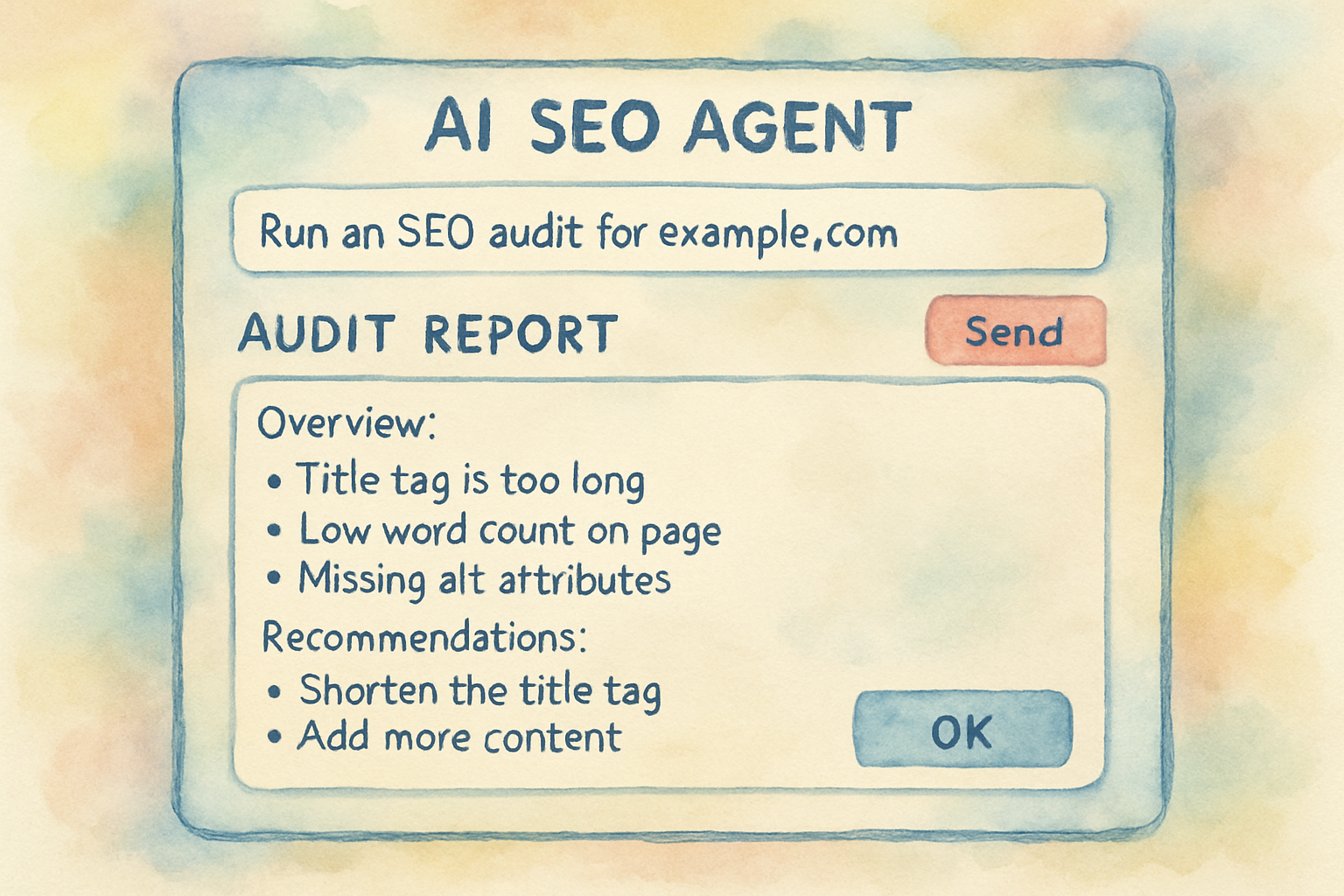
How Can Automated SEO Audits with AI Fit into Marketing Workflows?
Integrating AI SEO audits into your marketing process can boost efficiency and insight at every stage:
- Keyword Research: Use audit insights to identify gaps and opportunities.
- Content Creation: Align new content with AI-identified topics lacking in your niche.
- Technical Fixes: Assign prioritized audit tasks to developers promptly.
- Performance Monitoring: Regular AI audits track progress and flag regressions early.
- Competitive Strategy: Use AI competitor benchmarking to adjust campaigns in real time.
By automating routine SEO health checks, your team focuses on creativity and strategy, delivering better results faster.
Bold Tip: Schedule AI audits to run automatically with alerts. This keeps your SEO agile without manual effort.
How Do You Get Started with AI SEO Audit Tools?
Start by exploring leading platforms like Nightwatch or Alliai. Sign up, add your domains, and connect data sources.
Begin with simple prompts focusing on critical issues such as "check for broken links" or "analyze page load speed." As your confidence grows, customize scans, set up recurring audits, and invite team members to collaborate.
Don’t hesitate to leverage the onboarding guides and tutorials these tools provide—they lower the barrier for beginners.
Keep the focus on actionable insights and use the reports to prioritize fixes with the highest SEO impact. Continuous use embeds SEO best practices into your workflow and keeps your website competitive.
Frequently Asked Questions About Automate SEO Audits with AI
Can AI-powered SEO audits improve website rankings quickly?
AI audits identify and prioritize SEO issues for swift fixes that enhance site health and user experience, leading to improved search rankings over time. Immediate ranking jumps depend on resolving critical problems and content quality.
Are AI SEO audit tools suitable for small business websites?
Yes. Many AI audit solutions offer scalable features and user-friendly interfaces that small businesses can leverage without technical expertise.
How accurate are AI SEO audit recommendations?
AI audit accuracy improves with integration to real user data and continual algorithm updates. However, human review ensures strategic alignment and contextual interpretation.
Can AI auditing tools suggest content topics?
Yes, by analyzing content gaps and competitor keywords, AI tools can recommend relevant topics to target for improved SEO.
What's Your Next Step?
Tell us in the comments: How will you apply this to automate SEO audits with AI? For personalized advice, contact us!
Automating your SEO audits with AI is no longer optional; it’s a necessity in a competitive digital landscape. By embracing intelligent automation, you boost your website’s health and search visibility faster and more accurately than ever before. The combination of AI efficiency with human strategy unlocks a new level of SEO performance.
For further insights on streamlining SEO workflows and boosting your organic reach, explore our detailed guide on automating SEO content creation to complement your auditing process.
To stay informed on the latest SEO innovation and growth strategies, visit the Blog - Latest Articles | Rebelgrowth for expert updates and practical advice.
Also, don't forget to consider competitive backlink strategies to amplify your link profile. For proven methods, check out automated backlink building strategies that truly work in 2025.